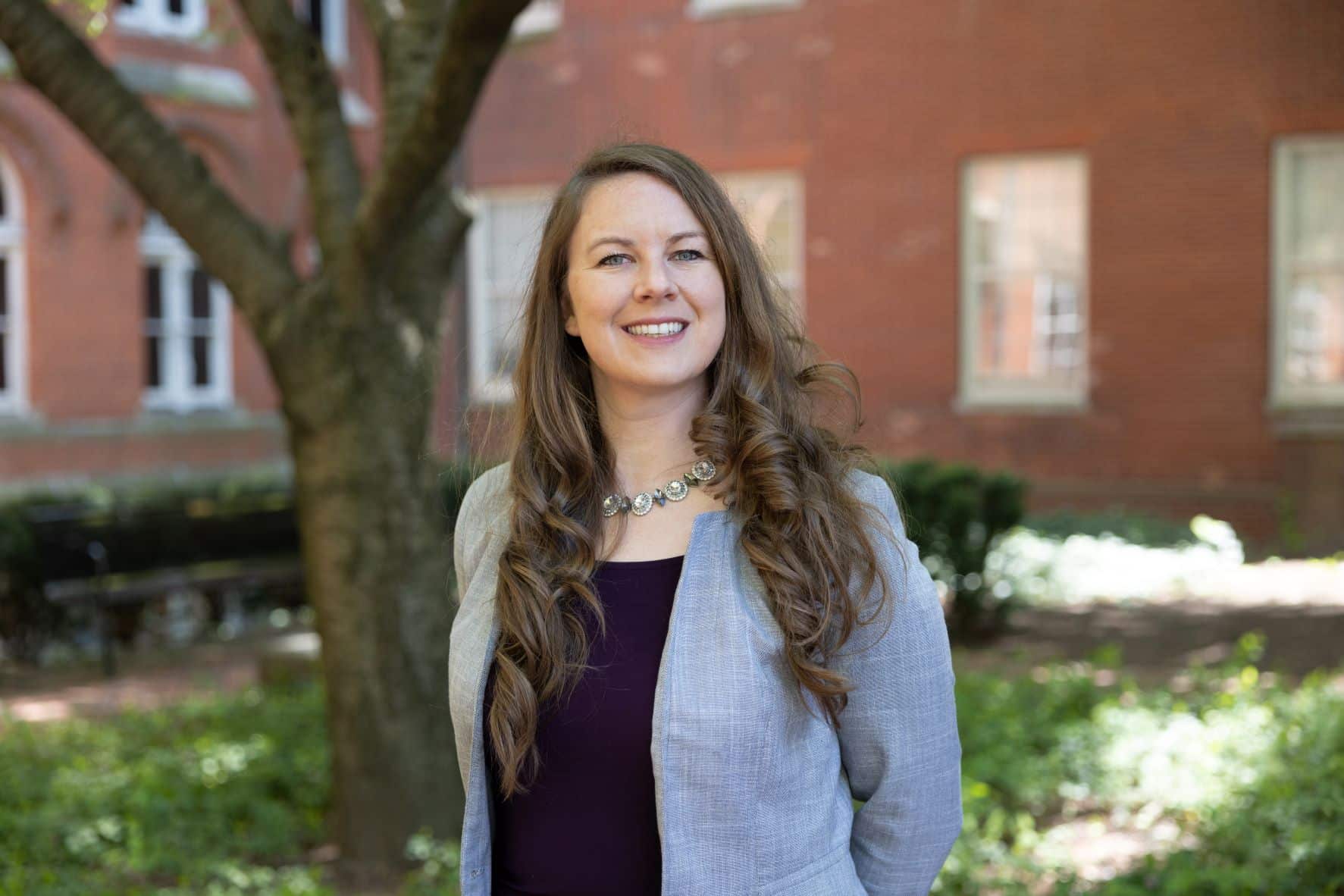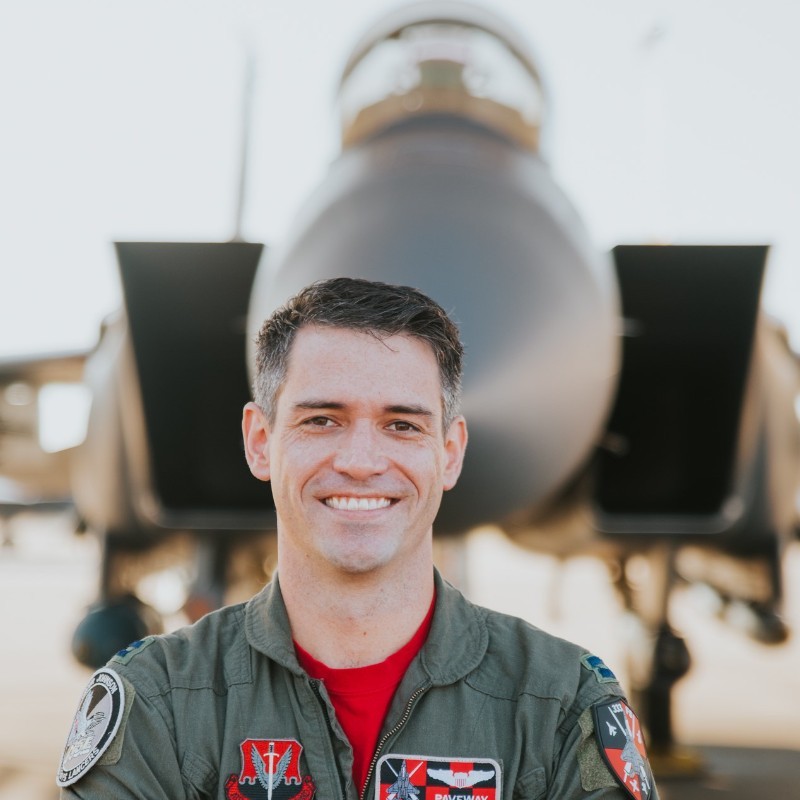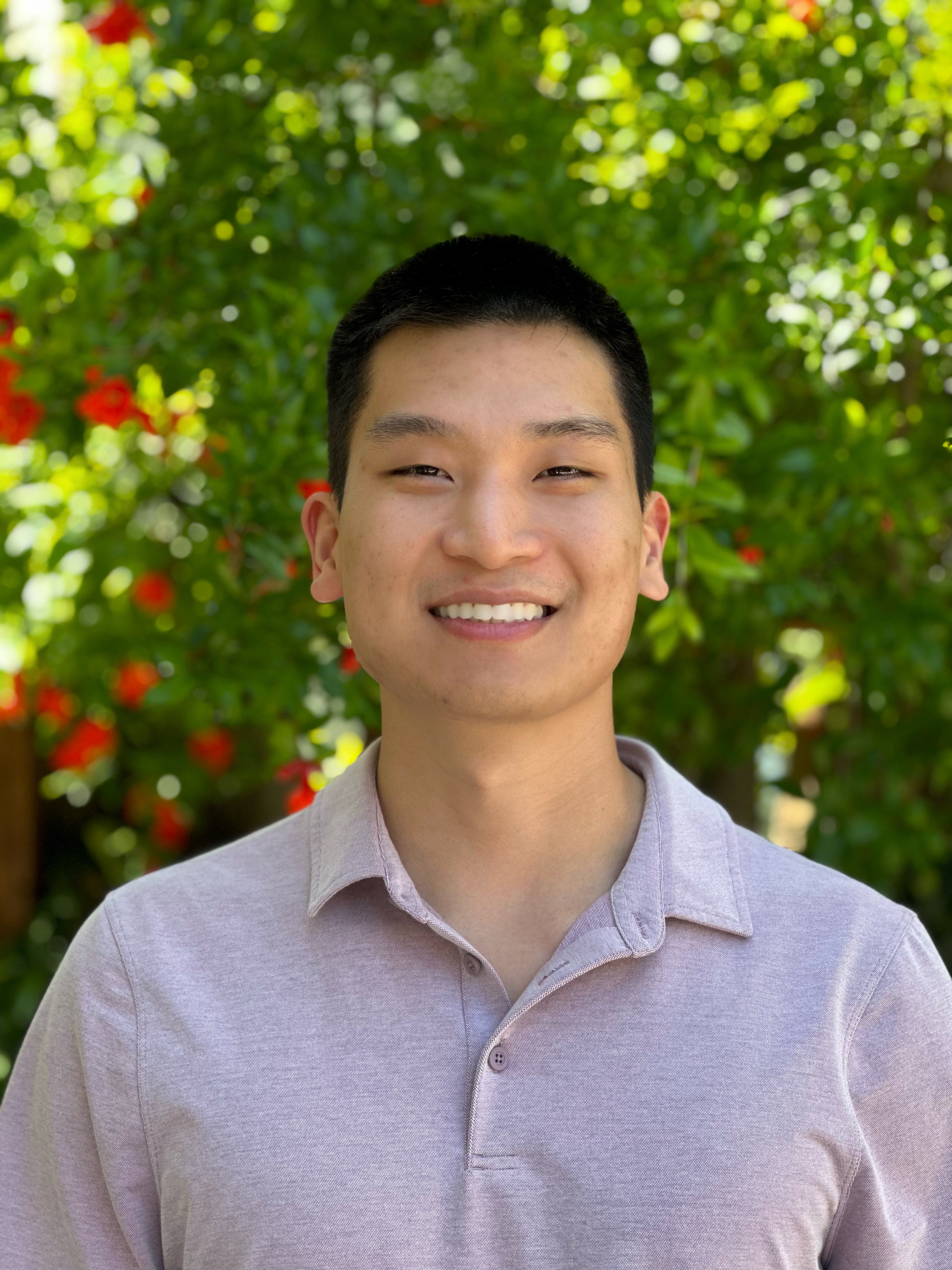Checkpoints:
Young Alumni Excellence Award Recipients
Lt. Col. Megan Biles '10, Maj. Joseph Bledsoe '11 & Mr. Anson Cheng '18
Lt. Col. Megan Biles '10
Lt. Col. Megan Biles ’10 didn’t grow up dreaming of a military career. Raised in Gresham, Oregon, she says her early ambitions revolved around competitive soccer and a desire to teach high school English. A recruiting call from the U.S. Air Force Academy changed her trajectory

“I didn’t come from a military background,” she says. “During my campus visit, I was drawn to the challenge, sense of purpose and strong community.” That sense of purpose led her to accept an appointment to the Academy, where she knew her limits would be tested. “My Christian faith played a big role,” Col. Biles says. “I saw it as a vocational calling — something that mattered beyond just a career.”
Then-cadet Biles arrived at USAFA ready to play intercollegiate soccer but eventually stepped away from the team to explore new athletic challenges, including the marathon and triathlon clubs. These clubs pushed her outside her comfort zone, taught her to stay steady under pressure, and encouraged her to pursue goals like completing the Ironman Wisconsin and, during a foreign immersion in China, running the Great Wall Marathon. But it wasn’t all smooth sailing. Biles says she didn’t have a strong math background. After a tough conversation with her academic adviser about whether the Academy was the right fit, she decided to persevere. That defining moment helped her recover academically and thrive. Her political science studies took her to West Point to represent USAFA at a conference, and to Vietnam for an international relations immersion.
On the military side, she participated in jump and powered flight training and served as summer cadet group commander for Combat Survival Training, helping reinstate the program after a long hiatus. The Academy, she says, taught her to never quit, to rely on a strong support system, to keep showing up when things are hard and to take chances even when the odds aren’t in her favor. After graduation, she earned her wings and flew the C-146A, deploying six times across multiple U.S. combatant commands. One of her assignments came during a volatile period in Burkina Faso, where she served as special operations forces liaison officer to the U.S. Embassy. The mission had a clear purpose, making her work incredibly fulfilling. As her career took off, she was selected as aide-de-camp to the vice commander of U.S. Special Operations Command at the Pentagon, then served as a legislative liaison and research contributor at the Defense Advanced Research Projects Agency. She also worked with the chief of staff and secretary of the Air Force, conducting strategic analysis and helping guide the Department of the Air Force reoptimization effort.
Outside the Air Force, she was a fellow and director of fellows for the Irregular Warfare Initiative. She was also a NextGen National Security Fellow with the Center for a New American Security. She continued learning, earning master’s degrees from Georgetown University and the School of Advanced Air and Space Studies. Now a Ph.D. candidate in the SAASS follow-on program, she’s studying military integration with allies and partners to help shape future policy. Throughout her career, Col. Biles has combined strategic thinking with a commitment to service. Her efforts as co-chair of the Air Force’s Barrier Analysis Working Group helped expand aviation readiness by allowing more flexibility to fly while pregnant. “We approached everything through the lens of readiness, risk, resources, retention and recruitment,” she says. “Too many existing policies were outdated and didn’t reflect the modern force or the realities of those serving.” These experiences taught her to conduct analysis, frame issues for greater impact and navigate complex institutions — skills that continue to serve her today.
“I try to lead with honesty, humility and a willingness to roll up my sleeves and do the hard work alongside the team,” Col. Biles says. She was surprised and humbled to be selected for the Young Alumni Excellence Award. “I didn’t even know I’d been nominated,” she says. “I feel grateful, blessed and, most of all, thankful for the people in my corner who’ve supported and uplifted me along the way.” For Col. Biles, being part of the Long Blue Line means you are never alone; you are part of something bigger. “I’m thankful for the many mentors I’ve gained throughout my journey,” she says. “You truly can go further together.”
Maj. Joseph Bledsoe '11
For Maj. Joseph “Paveway” Bledsoe ’11, leadership revolves around three main priorities: faith, family and being a fighter pilot. These guiding principles have taken him from his smalltown roots in rural Pennsylvania to the U.S. Air Force Academy and to flying the F-15E Strike Eagle. Although his family had no military background, he felt inspired to serve when his cousin graduated from the Academy in 2005. From middle school on, he was determined to pursue an appointment.

At USAFA, he committed himself to seizing every opportunity. After completing Basic Cadet Training, his classmates elected him class president. Bledsoe says his Academy experience taught him how to lead both vertically as a senior officer and horizontally on a peer-to-peer level. “The Academy really forced me, in quite a few of my leadership positions, to rely on peer leadership,” he says. “That’s where it starts and ultimately finishes.” Bledsoe studied biology, planning to attend medical school and become a surgeon. However, a firstie-year trip overseas with a C-130 unit shifted his focus. “I was hyperfocused on wanting to be a doctor,” he says. “The experience opened the door, and then firstie year I had the opportunity to fly at the airfield. I realized I can always get into medicine, but I can’t always get into this flying gig.” He dropped his medical school applications and submitted his name for pilot training.
For Bledsoe, the shift wasn’t farfetched. “In medicine and flying, there are a lot of commonalities. It’s on you to make a decision with what information you have and execute and solve the next problem,” he says. “That translates very well to the flying community.” After graduation, he studied international relations and economic policy at the University of Maryland before training on the T-6 and T-38, and ultimately flying the F-15E Strike Eagle. He says the rest is history. Flying the Strike Eagle provided leadership opportunities as a flight lead, instructor pilot and flight commander. He’s flown over 1,500 hours, including 70 combat missions over Syria in the ongoing effort to defeat ISIS. In addition to leading his peers, his time as a pilot gave him the chance to mentor many younger officers. These experiences prepared Bledsoe for his current role at USAFA as a fellow with the Institute for Future Conflict, where he is researching how U.S. airpower can be applied in near-peer competition, specifically in the South China Sea. He explains that the U.S. learned many lessons from the Global War on Terrorism, and he underscores the importance of preparing for potential conflicts in new arenas.
Outside of his research, he teaches and mentors cadets, whom he describes as inquisitive and forward-thinking. However, Bledsoe’s service to his alma mater began long before he joined the IFC. After graduating, he represented his classmates as a member of the Class Advisory Senate. His work on the CAS ultimately led to his appointment to the Association of Graduates Board of Directors, where he served from 2020 to 2024. In both roles, he aimed to reduce barriers to engagement, especially for younger graduates. He was also a strong voice of support in the AOG adopting its membership-for-all-graduates model. “There’s no shade of blue in the Long Blue Line,” he says. “Whether you’re the chief of staff of the Air Force and you graduate from here or you’re the last person to walk across the stage in the Class of 2025, everybody has the degree on their wall. That’s all that matters to be in this club.”
Those who recognized Bledsoe’s impact nominated him for the Young Alumni Excellence Award — an honor that caught him by surprise. He views the award as a reflection of the people who believed in him and the values that shaped him. “It’s humbling,” he says. “The award wasn’t the goal, but the things that went into that award — what you’ve done for the Academy, all the things you put your family through and everything you’ve done in the Air Force — it means you’ve done things that you set out to do from the age of 12, which is really humbling.” Being part of the Long Blue Line is especially meaningful to Bledsoe because of its rich heritage and the shared connection among all generations of graduates. Throughout all these experiences, his priorities haven’t changed: faith, family and being a fighter pilot. Next year, he and his wife, Alicia, will move with their three children to North Carolina, where Bledsoe will continue serving a higher purpose as he returns to flying the F-15E at Seymour Johnson Air Force Base. His next goal is to become a squadron commander.
Mr. Anson Cheng '18
Born in the United States to Taiwanese immigrants, Anson Cheng ’18 says he chose to attend the U.S. Air Force Academy because he wanted to serve a nation that had provided his family with so many opportunities. “Watching the people in our community show up for my family was a really rewarding experience that resonated with me,” he says, “and that was a huge part of why I wanted to find a way to give back to this country.” And when the time came to choose institutions of higher education, Cheng says he was influenced by his father, who served as a mechanic in the Taiwanese Air Force.

“It was an easy connection,” Cheng says. “He grew up really into planes, and I grew up going to a bunch of air shows because of his interest.” Cheng studied a wide variety of subjects while at USAFA, from philosophy to his eventual major, operations research. “I tried to load on extra courses — a lot of foreign area studies, geography, history, just a lot of additional electives that were kind of outside the scope of what I needed to graduate,” he says. “Part of that was trying to make the most of the Academy experience.” Cheng also made the most of the leadership opportunities while at the Academy, including creating a Wing-wide volunteer program and organizing financial literacy classes. “I loved it, honestly,” Cheng says of being a cadet. “Every day was me living by some of my closest friends that I still keep in touch with today. … Whether it’s the random things that happen in the dorm when you’re spending time with friends, the military training or all the other events that the Academy puts on — I think those experiences have really stuck with me, and it’s something I still look back on fondly.”
As an officer, Cheng distinguished himself as an operations research analyst at the Air Force Institute of Technology, where he researched artificial neural networks and later presented on his work at the 100th annual American Meteorological Society meeting. Cheng also contributed to the development of new analytical frameworks at the 86th Fighter Weapons Squadron and later helped lead cybersecurity operations at the Defense Information Systems Agency, including during historical events such as the SolarWinds breach, the withdrawal from Afghanistan, and the Russo-Ukrainian War. Cheng moved to the private sector in 2023, a transition that caught him somewhat off guard. “The biggest lesson when I separated was that as much as you prepare, it still kind of hits you like a brick wall,” he says. “There are moments where you feel like you lost your sense of community and belonging when you leave the military. And that was something I wasn’t expecting, or I thought I could handle. But one thing that really stuck with me was just how the military and veteran community, whether it’s USAFA alumni or the larger community as well, really shows up for you.”
As a civilian, Cheng has excelled, bringing his expertise to Plato Systems, a technology startup, and to SkyFi, a satellite imagery company, where he applied AI tools to both military and civilian uses. He also interned at Google in the Privacy, Safety, and Security Division supporting privacy efforts. Beyond his professional work, Cheng has volunteered with Service to School for the past three years, currently serving as the organization’s CFO, helping fellow veterans pursue higher education.
Currently pursuing dual graduate degrees at the Wharton School of Business and Harvard Kennedy School, Cheng says the Young Alumni Excellence honor is “super humbling, just because I know all my friends from my class are still out there doing a lot of great things. I’m just honored to be able to represent one of the young alumni for the year. It’s just another reminder to put my best foot forward every single day. But remember that again, there are a lot of other people who are out there killing it.” He then reflects on what it means to be part of the Long Blue Line. “It’s everything,” he says. “It’s something that no one can take away from me. It’s part of who I am for the rest of my life, and it’s continuing to inform who I’m going to become. I’m really thankful for being part of the Long Blue Line, the experiences at the Academy, the people I’ve met, the people I’ll continue meeting. Every day is a new experience for me, so, I’m really thankful for it.”




